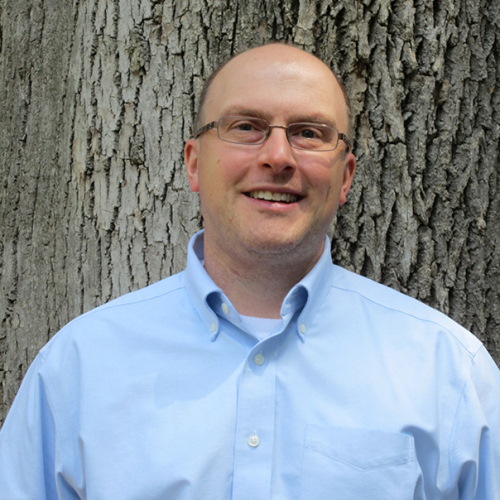
Professor West publishes scientific research with eight Wooster students

James West, professor of biochemistry and molecular biology, biology, and chemistry at The College of Wooster, worked with eight Wooster students to publish an article about their work centered in oxidative stress, which relates to a variety of biological processes, such as inflammation, aging, and other age-related diseases. The article, “Broader than expected tolerance for substitutions in the WCGPCK catalytic motif of yeast thioredoxin 2,” was published in Free Radical Biology & Medicine, a prestigious journal in biochemistry and molecular biology. Oxidative stress is caused by the buildup of molecules like peroxide and bleach. Together, West and the students researched an enzyme called thioredoxin, which protects cells against protein damage caused by oxidative stress.
While working on the project, West said that he and the student researchers “surveyed a set of about 70 different thioredoxin variants, each of which have slight changes near where the enzyme carries out its biochemical function.” They then monitored how the variants functioned in yeast cells and in a test tube. Through these observations, they learned that the enzyme tolerated a variety of changes in what is known as the “active site region.” West says that with their findings, scientists can more confidently predict which proteins may work similarly to thioredoxins in newly discovered organisms. He said that the research team’s work provides, “new insights into how thioredoxin evolved and how it counteracts oxidative stress in cells.”
West began this project in 2018 with the students in his Techniques in Biochemistry and Molecular Biology course, where they studied the topic in a semester long research project. West said that in the course, he used the project to teach students about amino acids, otherwise known as the building blocks which make up proteins. After completing the project with his students, the work evolved into multiple follow-up studies, as well as part of another Techniques in Biochemistry and Molecular Biology course.
West worked with students on this research for three years, during which seniors focused on different aspects of the work in their Independent Study projects. He also collaborated with three student research assistants in this time. These years of work were supported by the William H. Wilson Research Funds, the Copeland Fund for Independent Study, the Luce Fund for Distinguished Scholarship, and the Hamburger Fund for Interdisciplinary Studies at Wooster.
Through the project, several students participated in undergraduate research including Shayna Vicker ’21, Eran Maina ’21, Abby Showalter ’24, Nghi Tran ’21, Emma Davidson ’22, Morgan Bailey ’20, Stephen McGarry ’20, and Wilson Freije ’21. Davidson, a neuroscience major and student researcher who worked with West in between her freshman and sophomore years, has attributed much of her academic success to her time with West. “Some of my most memorable moments working with Professor West were not when I had great successes in the lab, but when I made mistakes,” said Davidson. “He taught me that mistakes are part of the process of learning and lab work and that in (relatively) small doses and with proper reflection can help enhance learning experiences.”
Published Jan. 27, 2022.
Posted in News on January 27, 2022.
Related Posts
Related Areas of Study
Chemistry
Access to labs, research opportunities, and small classes give chemistry majors lots of options after graduation.
Major MinorBiology
Explore molecular and cellular biology, ecology and more with top faculty and access to extensive lab facilities.
Major MinorBiochemistry & Molecular Biology
Biology and Chemistry combine in an interdisciplinary program for students with a passion for molecular events.
Major

